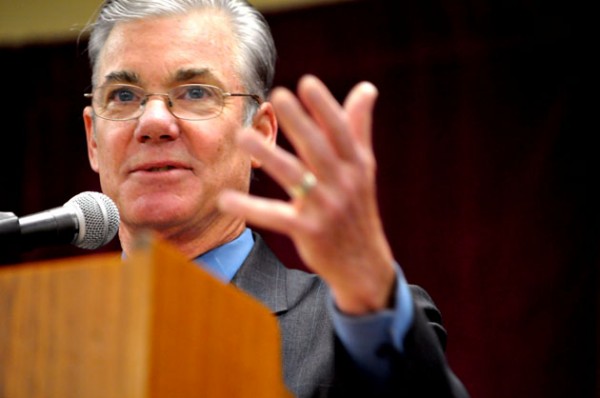LCFF Moves California to End Recent No Child Left Behind Waiver Effort

Complicated relations between California and the federal government on a state waiver for No Child Left Behind (NCLB) reached its conclusion. Seeing the effort as futile, the California Department of Education (CDE) announced it will no longer seek a waiver from the federal law. Schools continuing to under-perform based on NCLB may face federal sanctions in the near future.
The CDE is prioritizing Governor Jerry Brown's local control funding formula (LCFF) proposal over the possibility of obtaining a waiver. LCFF includes a new delegation of school funds based on the proportion of disadvantaged students in a district. However, the spending autonomy given to local districts in Brown's plan is said to be the complicating factor when state and federal officials discussed NCLB waiver requirements.
California Superintendent of Public Instruction Tom Torlakson and President of the State Board of Education Michael Kirst released a joint statement on Monday:
"While California’s efforts to improve its education system continue to move forward, including implementation of the Common Core State Standards and the modernization of our assessment and accountability systems, the standards for obtaining a federal waiver remain difficult to meet for a state committed to local flexibility and decision-making"
In the May revision of the 2013-2014 state budget proposal by Brown, the local control component of the plan:
"[LCFF] fundamentally shifts accountability from a system focused on state control of local spending to a system of local planning and goal setting to improve outcomes for students."
There are 37 states that have successfully obtained a NCLB waiver. Each waiver process has been an exchange of potential sanctions set by NCLB for federal reform measures. In California's case, the state is not submitting to federally implemented reforms and is sticking to its own reform plans.
The U.S. Department of Education has taken heat from House Republicans. The GOP says the department has been exercising too much authority by essentially bypassing Congress to form its own education policy, state-by-state, with the NCLB waiver system.
This is not the first time California attempted to obtain a waiver from the No Child Left Behind Act. The state was denied a waiver in its past two efforts in September 2011 and December 2012.
California's waiver process was already complicated by a group of 10 school districts, known as CORE, which seeks to establish its own waiver agreement with the federal education authorities. The California Office to Reform Education (CORE) is still being considered for the waiver.
California may be exercising its rights as a state in standing firm with its plan to reform education funding and accountability. The U.S. Department of Education may be overzealous in its efforts to reform state education systems. Both sides were unable to reconcile their visions for future education policy.




